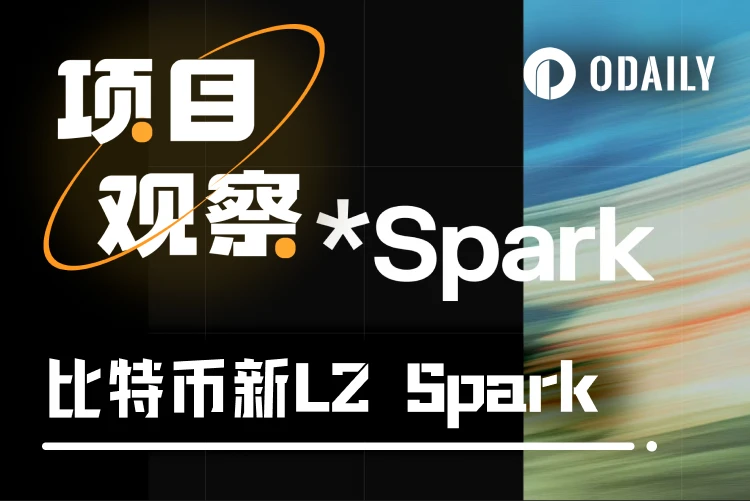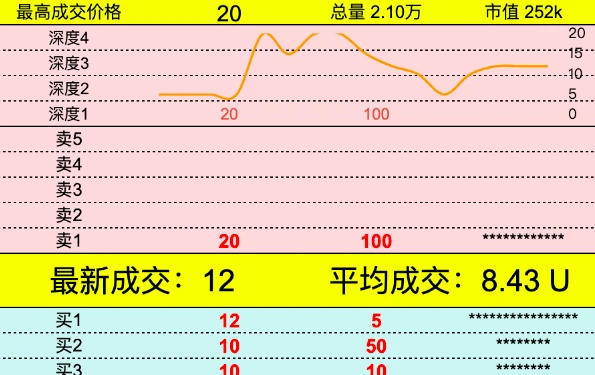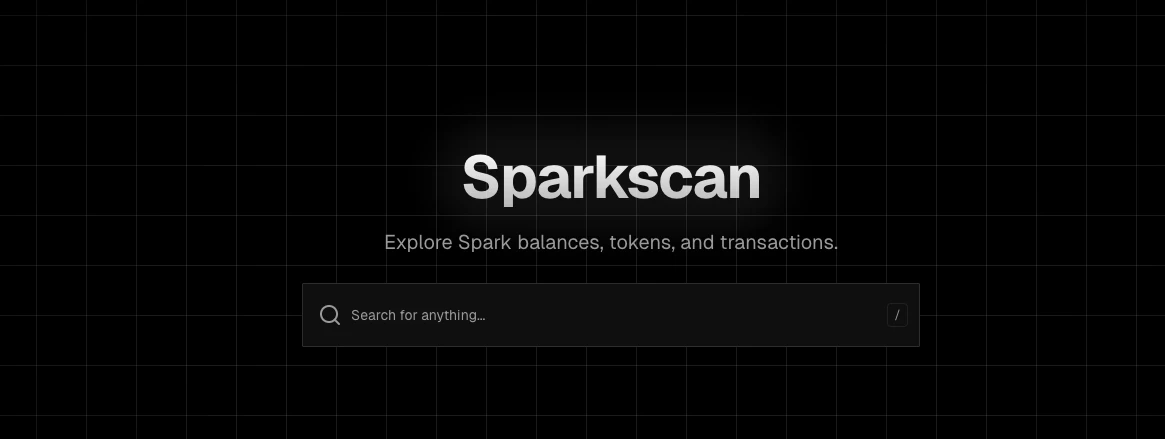Original | Odaily Planet Daily (@OdailyChina_)
_

In the Bitcoin ecosystem, creating a new asset issuance protocol is not particularly difficult; the challenge lies in having a community and project team that continuously "works" around that protocol. Recently, a new wave of protocol enthusiasm has emerged in the Bitcoin ecosystem, with many anonymous projects showcasing their ideas to the market. However, most of these are merely "old wine in new bottles," lacking infrastructure, development, and any takers.
Yet, amidst this dark forest, there are still serious teams. On May 20, the well-known Bitcoin ecosystem trading market Magic Eden announced its integration with the new Bitcoin L2 Spark and will co-host an event on May 26. Spark is a new type of Bitcoin scaling solution, with its mainnet test version officially launched on April 29. The first LRC20 token, FSPK, was born on May 8. Although the minting experience was subpar, it still triggered FOMO in the Bitcoin ecosystem community, with the current over-the-counter trading price for the first FSPK ranging from $12 to $20 (1 unit = 0.001), while the cost was about $2 per unit, marking at least a sixfold increase in price.

The collaboration between Magic Eden and Spark may also indicate that the on-chain trading market for LRC20 is about to launch. In addition to Magic Eden, Spark has partnered with several projects, and the ecological prototype is already taking shape, backed by the well-known VC a16z. Odaily Planet Daily will briefly introduce Spark, the currently issued LRC20 tokens, and its ecological projects in this article.
Spark: A Bitcoin Native L2 Designed for Payments and Settlements
Spark claims to be a Bitcoin native L2 designed for payments and settlements, but in reality, Spark employs an off-chain scaling solution, not an EVM-like chain or Rollup, and does not support smart contracts or a virtual machine. Therefore, Spark allows users to conduct instant, low-fee, and unrestricted self-custodial transactions of Bitcoin and other tokens (including stablecoins) off-chain, while having native interoperability with the Lightning Network, enabling token sending and receiving through the Lightning Network.
For Bitcoin, whether on-chain or off-chain scaling solutions, the primary concern for users is the security of Bitcoin, specifically whether Bitcoin entering L2 can be safely and unobstructedly withdrawn. Currently, the Spark network has only two operators: the parent company Lightspark and Flashnet (official statements will add more operators later). Thus, theoretically, for all transactions occurring on Spark, at least one operator must authorize the transaction along with the user for it to succeed. This design naturally brings risks; if both operators go down, the security of user funds is threatened.
However, even as an off-chain scaling solution, Spark still possesses non-custodial and Bitcoin-native characteristics. The core of Spark uses a shared signature protocol based on Bitcoin, operating in the form of a distributed ledger without an additional consensus mechanism. Users' Bitcoin deposits are directly mapped to Spark without any bridging or wrapping; meanwhile, users' funds remain in a non-custodial state. Even if Spark operators disappear or attempt to censor or refuse cooperation, users can still unilaterally force withdrawals to the Bitcoin mainnet, ensuring the safety of their funds.
The parent company of Spark is Lightspark, founded by David Marcus, who previously served as President of PayPal and Vice President of Messaging Products at Facebook. He was also invited to participate in the first crypto summit held at the White House on March 8. In terms of financing, on May 13, 2022, Lightspark completed over $170 million in Series A funding, led by a16z and Paradigm, with participation from Coatue Management, Ribbit Capital, Thrive Capital, Felix Capital, Matrix Partners, and Zeev Ventures, making for a very impressive funding lineup.
On April 29, Spark launched its public test version of the mainnet, with core functions such as sending and receiving Bitcoin, creating tokens (e.g., stablecoins), and Lightning interoperability fully operational. Developers can also use Spark's SDK to build applications.
Regarding network fees, users trading on the Spark network incur no fees, while depositing or withdrawing Bitcoin to/from Spark requires a certain Bitcoin on-chain transaction fee (which will incur a fee after 6-12 months), and transferring Bitcoin from Spark to the Lightning Network incurs a 0.25% fee plus routing fees.
Although the official statement clearly indicates that Spark has no tokens and will not have any airdrop or token TGE plans, shortly after the release of the Spark mainnet test version, LRC20 was fully explored by the market.
Spark's Native Token Protocol LRC20
LRC20 is Spark's native token protocol set to launch in the summer of 2024, which is also compatible with the Bitcoin mainnet and the Lightning Network, but it is still under development. Currently, LRC20 only supports operation on the Spark network.
LRC20 uses Bitcoin as the settlement layer, while Spark serves as the execution layer. Anyone can issue LRC20 tokens, but before issuing, users need to broadcast a transaction on the mainnet, embedding the token's identifier and metadata (name, supply, decimal places) into the OP_RETURN output. Once successfully broadcast, they can mint tokens on Spark.
LRC20 does not support a fair issuance model; after the token is issued, only the original issuing wallet can mint, and other addresses wishing to obtain tokens can only do so through Dev airdrops or distributions. Additionally, LRC20 supports freezing and burning operations, allowing the original issuing wallet to freeze tokens on any address, locking the tokens held by the frozen address, which cannot be sent or received unless the Dev unfreezes them; however, the original issuing wallet can only burn tokens it holds, and the burning is irreversible.
From the above characteristics, it is evident that LRC20 is indeed designed for stablecoin issuance, granting significant power to the original issuing address, but for other token-holding addresses, if they do not relinquish the freezing power, it conceals a centralization crisis. Nevertheless, several LRC20 tokens with strong consensus have already emerged in the market, but due to the need for computer terminals for minting and various manipulations by Devs in the early stages, the tokens are somewhat chaotic. Below, we will introduce them separately.
FSPK (ending in 8b93): The First LRC20 Token
Total Supply: 21 units
Over-the-Counter Trading Price: $12-20 per unit
Public Key: 02b1d59c286bb79b39d0b3f14dc2a532b1e97e5c32c6376caea41e0b8c39708b93
Issuance Date: May 8
The FSPK token, with a public key ending in 8b93, is the first LRC20 token issued by @fspk_spark. The total supply was originally set at 21 million units, but due to an error in the token supply setting by the project team, the final total supply is 21 units (the worst Dev in history). Therefore, currently, one FSPK (ending in 8b93) equals 0.001 tokens, with a single minting cost of 0.000021 BTC, approximately $2.
However, LRC20 itself cannot be minted fairly; thus, the minting process essentially involves users sending money to the project team's wallet, after which they manually distribute tokens to users (which is also quite labor-intensive), ultimately earning 0.441 BTC, approximately $47,187.
Currently, the over-the-counter price for FSPK (ending in 8b93) is $12-20 per unit.
FSPKS: Correcting the First FSPK (ending in 8b93)
Total Supply: 21 million units
Over-the-Counter Trading Price: Not available
Public Key: 029e4d50f931c170e100c1b7129e353cddd69c8ae50bf274e7a68b05144ef8b55e
Issuance Date: May 12
This is also a token issued by @fspk_spark. The project team realized that the total supply of 21 units for the first FSPK was indeed too low. Therefore, to better support subsequent DEX AMM or Spark DEX swaps, on May 21, the project team announced the issuance of a new token, FSPKS, to replace the first FSPK. The new FSPKS tokens will be airdropped to FSPK holders at a ratio of 1 FSPK to 1000 FSPKS. The project team also stated that the old FSPK will no longer be valid and will not appear in future AMMs.
FSPK (ending in 6c82)
Total Supply: 21 million units
Over-the-Counter Trading Price: $4-10 per unit (1 unit = 1000 tokens)
Public Key: 0374f5629ac68dbdf9600cc14c763b8be9f1ebb198b3c568b47f9811efbcf56c82
Issuance Date: May 11
Due to players encountering numerous difficulties while minting the first FSPK (ending in 8b93), such as transactions failing to confirm and tokens not being received, and with the total supply of the first FSPK (ending in 8b93) being only 21 units, the @Flashspark_ team decided to airdrop FSPK (ending in 6c82) to the first 21,000 users who transferred the first FSPK (ending in 8b93), including both confirmed and unconfirmed transactions. Currently, its over-the-counter trading price is $4-10 per unit, but its consensus is relatively weak.
SAT
Total Supply: 210 trillion units
Over-the-Counter Trading Price: Not available
Public Key: 02757529fa69b70e55cee583c03d58936c39fff134b83808745db1ff41c1603bdb
Issuance Date: May 11
SAT is also an airdrop given by anonymous Devs to all addresses that minted the first FSPK (ending in 8b93). Due to its inheritance of the large total supply tradition and zero cost, it has garnered community attention, but currently, there is no over-the-counter price.
SNOW
Total Supply: 21 million units
Over-the-Counter Trading Price: $19 per unit
Public Key: 0377abadfbab8cc1fd7382fab87835ab062fd72c3ae7662fa6b579210fca16cd59
Issuance Date: May 17
SNOW is launched by the Spark ecosystem project sparksat and is the first LRC20 token backed by a legitimate project team, thus receiving higher recognition from the community. Currently, its over-the-counter trading price is $19 per unit, with a cost of only $1 (this fee is also charged by the project team), marking a 19-fold increase in price.
Early Ecosystem Projects and Tools
The biggest difference between Spark and other fleeting new protocols is that, although still in its early stages, there are some steadfast builders within its ecosystem, reminiscent of the early BRC20 ecosystem. In addition to collaborating with Magic Eden, Spark has also established a partnership with the stablecoin issuance protocol brale to launch stablecoins on Bitcoin; and with Web3 infrastructure Privy to help project teams build dApps on Bitcoin.
Below are introductions to early projects and tools in the Spark ecosystem:
sparkscan
sparkscan is the browser for the Spark network, where users can enter Spark network addresses to view token balances, transaction records, etc. Users can also input token public keys to see the number of token holders, total supply, transaction history, and more.

SparkSat
SparkSat is the first fully functional web wallet tool on the Spark protocol, and it is also the project team for the LRC20 token SNOW, not operated by Spark officially. By importing a mnemonic phrase into SparkSat, users can clearly view their asset status and directly conduct deposits and withdrawals on the Bitcoin mainnet, as well as transactions on the Spark network and Lightning Network through SparkSat's frontend. Users can also directly use this tool to issue LRC20 tokens and view all LRC20 tokens in one place, making it the "Unisat" of the Spark protocol.

Flashnet
Flashnet is one of the two operators of the Spark protocol and is also the developer of the Spark browser sparkscan. On February 4, 2025, Flashnet completed a $4.5 million seed round of financing, with participation from UTXO Management, Accomplice, Soma Capital, and others.
Flashnet is dedicated to building a permissionless, non-custodial, Bitcoin-native DEX, and may also launch a Spark ecosystem DEX in the future. Additionally, it has partnered with the stablecoin issuance protocol brale to launch the Bitcoin stablecoin USDB.
免责声明:本文章仅代表作者个人观点,不代表本平台的立场和观点。本文章仅供信息分享,不构成对任何人的任何投资建议。用户与作者之间的任何争议,与本平台无关。如网页中刊载的文章或图片涉及侵权,请提供相关的权利证明和身份证明发送邮件到support@aicoin.com,本平台相关工作人员将会进行核查。




